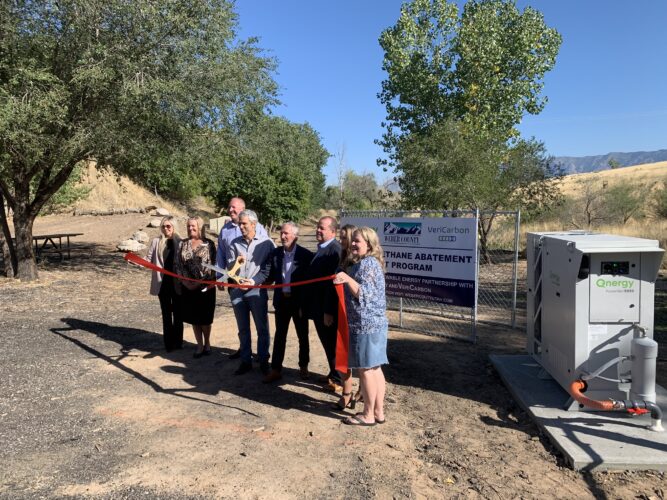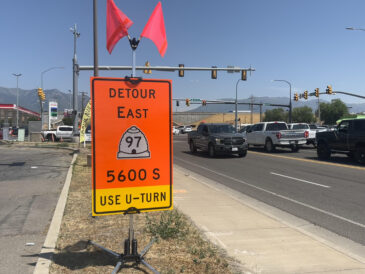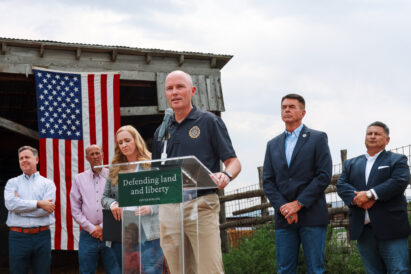Methane-capture pilot program launches at former Weber County landfill

Rob Nielsen, Standard-Examiner
Officials cut the ribbon on a Qnergy PowerGen generator meant to capture methane and turn it into electricity at a former Weber County landfill Thursday, Sept. 14, 2023.A pilot program is looking into the potential for alleviating a dangerous greenhouse gas as well as the potential for tens of thousands of former landfills to help generate electricity.
Thursday morning, a ribbon-cutting was held for the installation of a PowerGen generator meant to take the methane produced by the former landfill next to the Weber County Archery Park and turn it into electricity. The pilot program is a partnership between the Weber County Economic Development Office and Qnergy.
During a short ceremony before the official ribbon-cutting, Stephanie Russell, Weber County economic development director, said this is a bit more exciting than most infrastructure projects.
“This has been a fun project in the making,” she said. “A lot of times, we get saddled with water projects or sewer projects. This is a really interesting and innovative product and a partnership with one of our local businesses.”
Weber County Commissioner Gage Froerer said this project says a lot about how Weber County works with local businesses.
“This is just a shining example that we do welcome new companies in,” he said. “But we also support our local businesses. We support Qnergy. We want to make sure our local companies have the full support and economic power that Stephanie and her crew put behind what we do to promote our local businesses.”
Qnergy CEO Ory Zik said methane is an environmental threat that can be mitigated by harnessing it.
“After carbon dioxide, methane is the most potent greenhouse gas polluter,” he said. “But unlike carbon dioxide, methane is a fuel, so you can turn it into useful energy, and that’s what we’re doing here.”
He added that there is a lot of untapped potential throughout the country.
“There’s about 30,000 closed landfills in the U.S.,” he said. “They emit the equivalent methane of a little bit more than 1 million cars.”
Zik said the single unit that was installed in Weber County’s old landfill abates about the equivalent of 120 vehicles worth of methane. The generator on its own is enough to power two or three homes.
Troy McKinley, president of VeriCarbon, said his company is working to make such generators economical for users.
“We created VeriCarbon to fix what we saw was wrong with the carbon markets — they’re very disjointed, inefficient,” he said. “We developed a software to to take projects like this and run carbon credits through them using (American Carbon Registry) methodologies. That’s what we’re doing with this one as a pilot project with Qnergy and Ory, running it through, getting them with the process and what we’re doing and then also developing carbon credits to help monetize these projects to make them more feasible for communities around the state and across the country.”
Following the ribbon-cutting, Zik told the Standard-Examiner that Qnergy has 2,000 similar generators already deployed across the U.S., Canada and Latin America. Currently, they are installed largely at natural gas facilities, though one has been installed at an operational landfill in Maryland. The system debuted Thursday is the first installed at a closed landfill.
Zik said the generator utilizes a Stirling engine to generate electricity.
“The Stirling engine is something that was invented about 200 years ago, but no other company ever on the planet Earth managed to turn this Stirling technology into a power generator, except Qnergy,” he said. “The Stirling engine has two unique advantages and one disadvantage at this point.”
He said that one of the largest advantages is the engine is virtually maintenance free.
“If you would put a regular generator here, you would have to maintain it every two weeks or so to work 24/7,” he said. “And they can operate on any type of dirty, unrefined methane.”
Zik said the disadvantage comes down to Qnergy being a small operation at the moment.
“If you compare it to all of the generator companies and all the car companies, our quantities are low — thousands per year, not millions per year — so our prices are high,” he said. “These installations allow us to increase volume, reduce our price and go to larger and larger markets.”
He added that the pilot program will be looking at a couple of things in the coming months to see if it is successful for deployment to other shuttered landfills.
“The technical factor is we want to see if the landfill produces enough methane long-term that we can run a generator and produce electricity and if the methane gas has a sufficient concentration and flow,” he said. “Commercially, we’re working with VeriCarbon to make sure we capture carbon credits for this project so we can go to other communities across the state and across the country and offer them this technology for free and everyone can benefit from the carbon credit and avoided emissions.”



